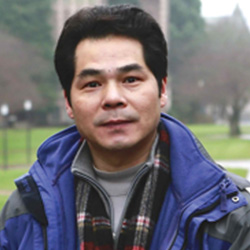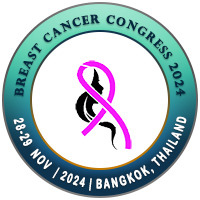
Li-xin Wang
Medical School of Southeast University, ChinaTitle: Thymosin ?-1 reverses polarization of efferocytotic M2-TAMs via a lysosomal TLR7-SHIP1 cascade
Abstract
Chemotherapy is one of the most important strategies of breast cancer therapy. However, it has a dual role in anti-tumor immunity. On one hand, chemotherapy can induce the generation of new tumor antigens by tumor cells, which facilitates intaking, processing and presenting tumor neoantigens by macrophages. On the other hand, the immunosuppressive phenotype of tumor associated macrophages (TAMs) generated by efferocytosis is amplified in conditions in which tumor cell death is prevalent. Thus, targeting of efferocytosis is a potential novel therapeutic option in a breast cancer setting. Here we report that, in the breast tumor microenvironment, thymosin ?-1 (T?-1) significantly reverses M2 polarization of IL-10-producing tumor-associated macrophages (TAMs) during efferocytosis induced by apoptotic cells. Mechanistically, T?-1, which adhered to apoptotic tumor cells and was internalized by macrophages via efferocytosis, triggered the activation of SH2-containing inositol 5?-phosphatase 1 (SHIP1) through the lysosomal toll-like receptor 7 (TLR7)/MyD88 pathway, subsequently resulting in dephosphorylation of efferocytosis-activated TBK1 and reduction of efferocytosis-induced IL-10. Meanwhile, TLR8 and its downstream signaling molecules were required for T?-1?induced secretion of IL-6 in efferocytotic macrophages. Moreover, T?-1 combined with epirubicin chemotherapy markedly suppressed tumor growth in an in vivo breast cancer model by modifying the phenotype of efferocytotic TAMs and stimulated anti-tumor responses of tumor-infiltrating CD4+ and CD8+ T cells . In conclusion, T?-1 improved the curative effect of chemotherapy by shaping TAMs plasticity towards an anti-tumor phenotype in a lysosomal TLR7/8-dependent manner, suggesting that T?-1 injection immediately after chemotherapy may contribute to highly synergistic anti-tumor effects in breast cancer patients.
Biography
Li-xin wang has completed his PHD in 2003 from Medical school of Fudan University, China. He finished his post-doctor training in 2006 from School of Medicine, Oregon Health & Science University, USA. He is member of Chinese Society for Immunology, and specially the vice chairman of the Jiangsu Society for Immunology. He is the academic leader of Department of Microbiology and Immunology in Medical School of Southeast University with over 100 publications.

